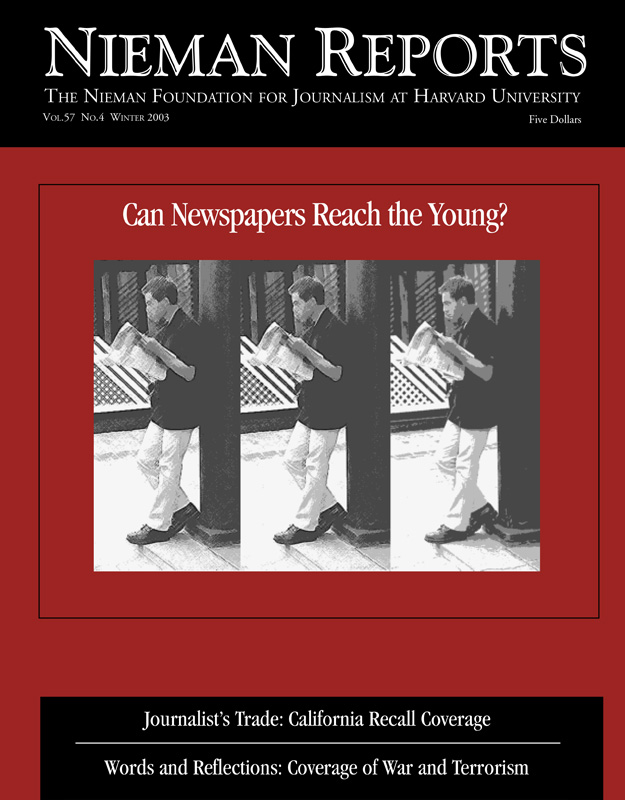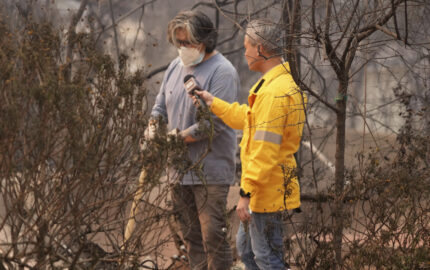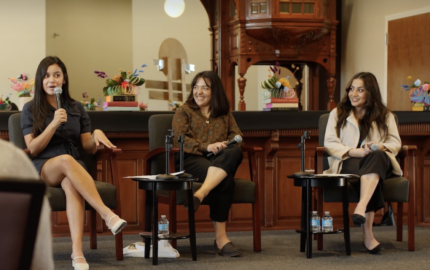
Can Newspapers Reach the Young?
Newspaper reading isn’t a daily habit for most young people. Instead they catch headlines on Web sites, share opinions on Weblogs, and see breaking news alerts along TV scroll bars. Nor do they think they should pay for news reporting. “Deliver the newspaper to me free, and I’ll take a look,” typical young readers tell focus groups as news organizations look for ways to unlock the mysteries of how to connect with these reluctant consumers. – Melissa Ludtke, Editor
Between October 31, 2001 and September 19, 2002, 20 sessions were held in which past and present government officials, foreign and domestic journalists, and scholars discussed topics related to the waging of and reporting on war. This book contains edited transcripts of those conversations. What follows is an excerpt from the chapter called “Dissent,” 
The Media and the War on Terrorism
Edited by Stephen Hess and Marvin Kalb
The Brookings Institution. 307 Pages. $22.95 Paperback.in which a panel comprised of pollster Peter D. Hart; Boston Globe media critic Mark Jurkowitz; journalism professor, 1986 Nieman Fellow, and former newspaper editor Geneva Overholser; human rights activist Alex Arriaga, and National Public Radio anchor Robert Siegel discussed the press and coverage of dissent. The conversation took place on February 27, 2002.
“In wartime, dissent carries an additional nuance—it not only denotes a difference of opinion, it suggests the minority squaring off against the majority, righteously arguing its case. Like the Supreme Court justice who registers a dissenting opinion, the dissenter, even the lone dissenter, has the right in a free country to register his or her opposition to the majority opinion of society and to government policy. So it was during the Vietnam War, frequently enough that dissent in war came to be seen as a natural appendage of public opinion in recent American history. So the question arose, after the United States destroyed the Taliban regime in Afghanistan and prepared to fight Saddam Hussein in Iraq: Where was dissent in this ugly and unusual war against terrorism? …
“… He [Jurkowitz] then produced anecdotal evidence to support his view that reporters were trimming their editorial sails out of concern that critical stories would kick up a patriotic backlash against the press. Overholser agreed with the Jurkowitz line of analysis. She believed that too few tough questions were being asked, too few dissident voices being heard. The result, according to Arriaga, was that our civil liberties were being jeopardized.
“Siegel provided yet another perspective. Normally the journalist was the one who produced the ‘first draft of history,’ said the NPR anchor. Now, it was the Pentagon and its unorthodox spokesman, Defense Secretary Donald Rumsfeld. By briefing almost daily, he controlled the message. Even if reporters ran contradictory stories, Overholser said, the public tended to believe Rumsfeld—he commanded the PR field.
“Patriotism was the administration’s ally, building a protective wall around its policy. Americans were outraged by the terrorist assaults, and they overwhelmingly supported the President’s response. The Taliban regime in Afghanistan collapsed so quickly that there was no time for dissent in the United States to emerge and grow. Siegel noted that there were few protests on campuses, fewer demonstrations in central squares. If there was real criticism or anger, he said, NPR would cover it, ‘but that’s barely happening.’ This was a ‘fascinating moment’ of ‘near unanimity’ in American public opinion. If the war continued for years, he projected, there still might not be dissent of the type seen during the Vietnam War.”

The Media and the War on Terrorism
Edited by Stephen Hess and Marvin Kalb
The Brookings Institution. 307 Pages. $22.95 Paperback.in which a panel comprised of pollster Peter D. Hart; Boston Globe media critic Mark Jurkowitz; journalism professor, 1986 Nieman Fellow, and former newspaper editor Geneva Overholser; human rights activist Alex Arriaga, and National Public Radio anchor Robert Siegel discussed the press and coverage of dissent. The conversation took place on February 27, 2002.
“In wartime, dissent carries an additional nuance—it not only denotes a difference of opinion, it suggests the minority squaring off against the majority, righteously arguing its case. Like the Supreme Court justice who registers a dissenting opinion, the dissenter, even the lone dissenter, has the right in a free country to register his or her opposition to the majority opinion of society and to government policy. So it was during the Vietnam War, frequently enough that dissent in war came to be seen as a natural appendage of public opinion in recent American history. So the question arose, after the United States destroyed the Taliban regime in Afghanistan and prepared to fight Saddam Hussein in Iraq: Where was dissent in this ugly and unusual war against terrorism? …
“… He [Jurkowitz] then produced anecdotal evidence to support his view that reporters were trimming their editorial sails out of concern that critical stories would kick up a patriotic backlash against the press. Overholser agreed with the Jurkowitz line of analysis. She believed that too few tough questions were being asked, too few dissident voices being heard. The result, according to Arriaga, was that our civil liberties were being jeopardized.
“Siegel provided yet another perspective. Normally the journalist was the one who produced the ‘first draft of history,’ said the NPR anchor. Now, it was the Pentagon and its unorthodox spokesman, Defense Secretary Donald Rumsfeld. By briefing almost daily, he controlled the message. Even if reporters ran contradictory stories, Overholser said, the public tended to believe Rumsfeld—he commanded the PR field.
“Patriotism was the administration’s ally, building a protective wall around its policy. Americans were outraged by the terrorist assaults, and they overwhelmingly supported the President’s response. The Taliban regime in Afghanistan collapsed so quickly that there was no time for dissent in the United States to emerge and grow. Siegel noted that there were few protests on campuses, fewer demonstrations in central squares. If there was real criticism or anger, he said, NPR would cover it, ‘but that’s barely happening.’ This was a ‘fascinating moment’ of ‘near unanimity’ in American public opinion. If the war continued for years, he projected, there still might not be dissent of the type seen during the Vietnam War.”


